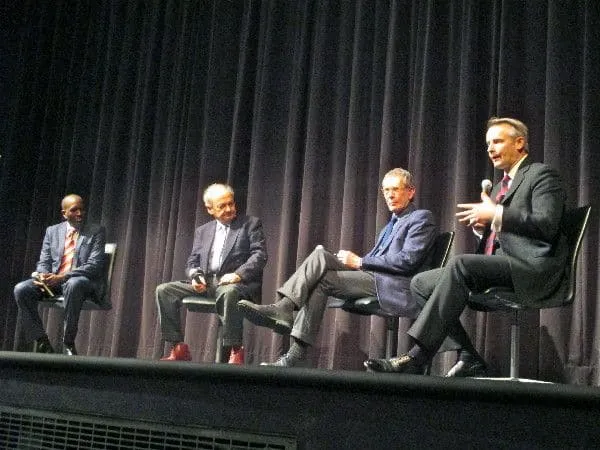 |
| Nzioki wa Makau, Simon Trevor, Arne Glimcher and Ian Saunders talk about White Gold at MoMA
Photo: Anne-Katrin Titze |
 |
| Christie Brinkley and Sigourney Weaver bring awareness Photo: Anne-Katrin Titze |
Two days later, on November 14, 2013, a six-ton stockpile of seized ivory was crushed by the US Fish and Wildlife Service in an effort to bring forth a worldwide trade ban in ivory.
White Gold is the first film produced by the African Environmental Film Foundation for international distribution. Jackie Chan replaces Hillary Rodham Clinton as the narrator for the Mandarin-speaking Chinese audiences. The support for the cause came from a diverse group who walked the red carpet including Christie Brinkley, David Schwimmer with Zoe Buckman, Cleo Wade with Mia Moretti, Cynthia Rowley and Hanneli Mustaparta.
Simon Trevor's White Gold puts an end to fantasies of glamour and harmless luxury based on ignorance and lies.
Arne Glimcher: This is an incredible war that's going on. It's very complicated and infiltrating entire communities in different countries.
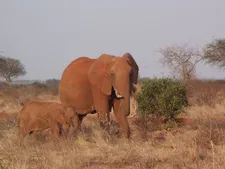 |
| An elephant and her calf in Tsavo, where the animals face the threat of poaching Photo: Amber Wilkinson |
Ian Saunders: In many cases, not just the animals but the people suffer a great deal and in many cases their stories are never told. What we are doing with the film foundation and the Tsavo Trust is developing a concept we call stabilisation through conservation. By using wildlife to give people the option of freedom of action and freedom of thought because, quite frankly, it's difficult to ask a rural community in Africa to guard their wildlife when they've got an AK-47 pointing at their head and no food in their bellies.
AG: As a younger man, Simon [Trevor] was the game warden of Tsavo [Kenya] and he spent his entire life living in Tsavo. Whenever something happens, Simon's called and is there with his camera.
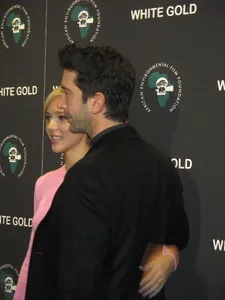 |
| David Schwimmer with Zoe Buckman on the red carpet Photo: Anne-Katrin Titze |
Simon Trevor: The film started many years ago. During the 50 years I've been there I've seen about 40,000 elephants killed in that one part alone. You expect the elephants to be completely wild and aggressive toward humans. But let me tell you quickly about an incident that happened a few years ago. I live in a house and right where you are sitting below me [he points from the stage to the first rows of seats in the theatre] is a small water hole and the elephants come and drink there.
One day I was on the veranda of my house with about ten people and these elephants came up to drink. An old elephant detached herself from the herd and walked straight up to the house. And I said to people, just stay still, you'll be fine. This huge animal came right up, held her trunk out like an arrow or a bullet, put her trunk right between the front lines of the people and took hold of a woman's wrist who was standing at the back of the line. She [the elephant] then pulled away, shook her head and walked back to the elephants. That woman had a 50-year-old ivory bracelet on her wrist. How does science solve that one? That to me is what this film is about as much as what Ian said, which is so important. Never underestimate the effect of the ivory trade to people as well as the animals. To me, the heart is what I just told you about elephants. Something we could never explain.
Nzioki wa Makau: What I'm waiting for on our part, our government - the offense of poaching is not punished sufficiently.
AG: There are about 20 big ivory shops, antique/ivory shops in New York City. There's no way to tell, as Hillary Clinton said, when that ivory came out of Africa. So we really just have got to stop the ivory trade itself. We've got to stop the consumer. Ivory should become a pariah on your wrist and in your home. It should be something to be really embarrassed about having.
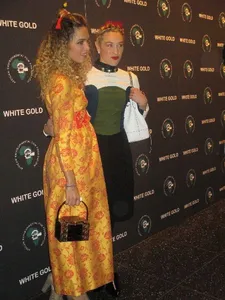 |
| Cleo Wade with Mia Moretti stare down the media for the cause Photo: Anne-Katrin Titze |
NM: I want to chip in. In addition, the US government has made a pact with African countries for the protection of wildlife. President Obama gave an executive order and we are hoping there will be a legal response toward anti-poaching in Africa.
On the global stockpiles of ivory:
AG: The stockpile is confiscated ivory, illegal ivory.
NM: The ivory becomes the possession of the government. At one point we have to dispose of them - normally an auction, ...contraband items such as drugs or ivory are destroyed. It took Kenya a long time but we did destroy our stockpile. Right now, we already have another stockpile which probably should be destroyed as well.
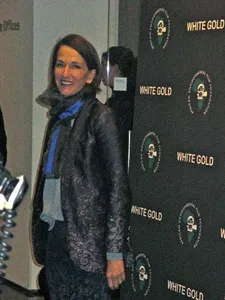 |
| Fashion designer Cynthia Rowley wholeheartedly supports the ivory ban Photo: Anne-Katrin Titze |
AG: There are people who are unaware that the elephants are being killed and there are people who don't care, who know about it and still buy ivory. That's what this film is about. The film has been taken to China and we'll show it in as many places as we possibly can. The Chinese version is narrated by Jackie Chan in Mandarin. That's very important because he had a huge role in stopping restaurants from serving shark fin soup. He is a great conservationist. You have to educate people, make them aware of what's happening, who are very far from Africa.
ST: It's not impossible to change this around… I'm not 100% pessimistic at all.
AG: Well, I'm 100% optimistic. I think we can make anything happen.
Read more about what the stars said regarding the film on the red carpet.
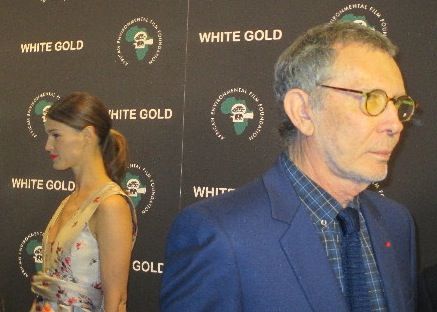 |
| Fashion blogger Hanneli Mustaparta and White Gold producer Arne Glimcher Photo: Anne-Katrin Titze |





















